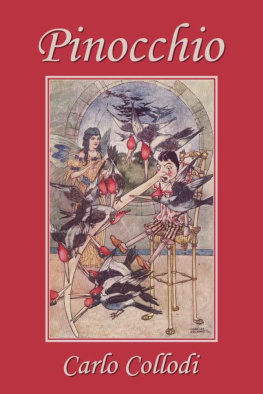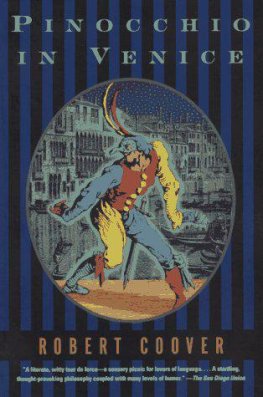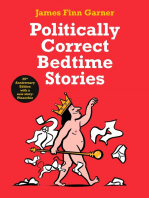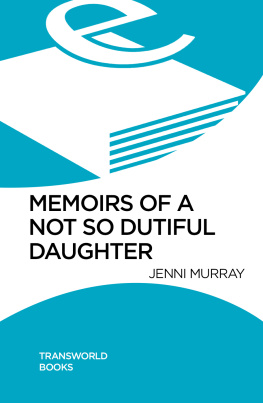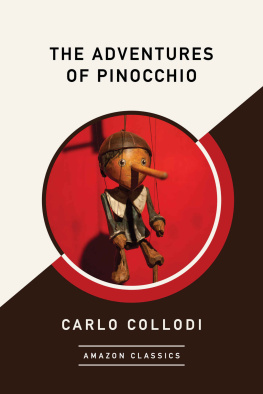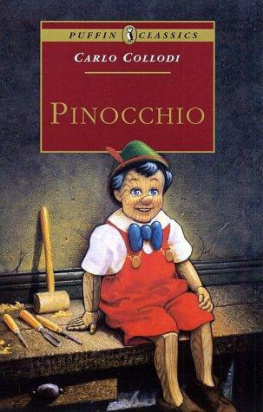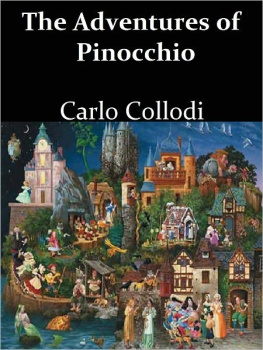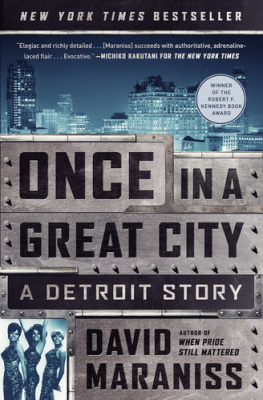Pinocchio
by
Carlo Collodi
Yesterday's Classics
Chapel Hill, North Carolina
Cover and Arrangement 2010 Yesterday's Classics, LLC
All rights reserved. No part of this book may be reproduced or retransmitted in any form or by any means without the written permission of the publisher.
This edition, first published in 2010 by Yesterday's Classics, an imprint of Yesterday's Classics, LLC, is an unabridged republication of the work originally published by J. M. Dent and Sons, Ltd. in 1911. This title is available in a print edition (ISBN 978-1-59915-177-9).
Yesterday's Classics, LLC
PO Box 3418
Chapel Hill, NC 27515
Yesterday's Classics
Yesterday's Classics republishes classic books for children from the golden age of children's literature, the era from 1880 to 1920. Many of our titles are offered in high-quality paperback editions, with text cast in modern easy-to-read type for today's readers. The illustrations from the original volumes are included except in those few cases where the quality of the original images is too low to make their reproduction feasible. Unless specified otherwise, color illustrations in the original volumes are rendered in black and white in our print editions.
Contents
CHAPTER I
THIS TIME MASTER CHERRY WAS PETRIFIED.
Master Cherry Finds a Piece of Wood
How it came to pass that Master Cherry the carpenter found a piece of wood that laughed and cried like a child.
T HERE was once upon a time...
"A king!" my little readers will instantly exclaim.
No children, you are wrong. There was once upon a time a piece of wood.
This wood was not valuable: it was only a common log like those that are burnt in winter in the stoves and fireplaces to make a cheerful blaze and warm the rooms.
I cannot say how it came about, but the fact is, that one fine day this piece of wood was lying in the shop of an old carpenter of the name of Master Antonio. He was, however, called by everybody Master Cherry, on account of the end of his nose, which was always as red and polished as a ripe cherry.
No sooner had Master Cherry set eyes on the piece of wood than his face beamed with delight; and rubbing his hands together with satisfaction, he said softly to himself:
"This wood has come at the right moment; it will just do to make the leg of a little table."
Having said this he immediately took a sharp axe with which to remove the bark and the rough surface.Just, however, as he was going to give the first stroke he remained with his arm suspended in the air, for he heard a very small voice saying imploringly, "Do not strike me so hard!"
Picture to yourselves the astonishment of good old Master Cherry!
He turned his terrified eyes all round the room to try and discover where the little voice could possibly have come from, but he saw nobody! He looked under the benchnobody; he looked into a cupboard that was always shutnobody; he looked into a basket of shavings and sawdustnobody; he even opened the door of the shop and gave a glance into the streetand still nobody. Who, then, could it be?
"I see how it is," he said, laughing and scratching his wig; "evidently that little voice was all my imagination. Let us set to work again."
And taking up the axe he struck a tremendous blow on the piece of wood.
"Oh! oh! you have hurt me!" cried the same little voice dolefully.
This time Master Cherry was petrified. His eyes started out of his head with fright, his mouth remained open, and his tongue hung out almost to the end of his chin, like a mask on a fountain. As soon as he had recovered the use of his speech, he began to say, stuttering and trembling with fear:
"But where on earth can that little voice have come from that said Oh! oh!?... Here there is certainly not a living soul. Is it possible that this piece of wood can have learnt to cry and to lament like a child? I cannot believe it. This piece of wood, here it is; a log for fuel like all the others, and thrown on the fire it would about suffice to boil a saucepan of beans.... How then? Can anyone be hidden inside it? If anyone is hidden inside, so much the worse for him. I will settle him at once."
So saying, he seized the poor piece of wood and commenced beating it without mercy against the walls of the room.
Then he stopped to listen if he could hear any little voice lamenting. He waited two minutesnothing; five minutesnothing; ten minutesstill nothing!
"I see how it is," he then said, forcing himself to laugh and pushing up his wig; "evidently the little voice that said Oh! oh! was all my imagination! Let us set to work again."
But as all the same he was in a great fright, he tried to sing to give himself a little courage.
Putting the axe aside he took his plane, to plane and polish the bit of wood; but whilst he was running it up and down he heard the same little voice say, laughing:
"Have done! you are tickling me all over!"
This time poor Master Cherry fell down as if he had been struck by lightning. When he at last opened his eyes he found himself seated on the floor.
His face was quite changed, even the end of his nose, instead of being crimson, as it was nearly always, had become blue from fright.
CHAPTER II
Master Cherry Gives a Present to Geppetto
Master Cherry makes a present of the piece of wood to his friend Geppetto, who takes it to make for himself a wonderful puppet, that shall know how to dance, and to fence, and to leap like an acrobat.
A T that moment some one knocked at the door.
"Come in," said the carpenter, without having the strength to rise to his feet.
A lively little old man immediately walked into the shop. His name was Geppetto, but when the boys of the neighbourhood wished to put him in a passion they called him by the nickname of Polendina, because his yellow wig greatly resembled a pudding made of Indian corn.
Geppetto was very fiery. Woe to him who called him Polendina! He became furious, and there was no holding him.
"Good Day, Master Antonio," said Geppetto; "what are you doing there on the floor?"
"I am teaching the alphabet to the ants."
"Much good may that do you."
"What has brought you to me, neighbour Geppetto?"
"My legs. But to say the truth, Master Antonio, I am come to ask a favour of you."
"Here I am, ready to serve you," replied the carpenter, getting on to his knees.
"This morning an idea came into my head."
"Let us hear it."
"I thought I would make a beautiful wooden puppet; but a wonderful puppet that should know how to dance, to fence, and to leap like an acrobat. With this puppet I would travel about the world to earn a piece of bread and a glass of wine. What do you think of it?"
"Bravo, Polendina!" exclaimed the same little voice, and it was impossible to say where it came from.
Hearing himself called Polendina Geppetto became as red as a turkey-cock from rage, and turning to the carpenter he said in a fury:
"Why do you insult me?"
"Who insults you?"
"You called me Polendina!..."
"It was not I!"
"Would you have it, then, that it was I? It was you, I say!"
"No!"
"Yes!"

